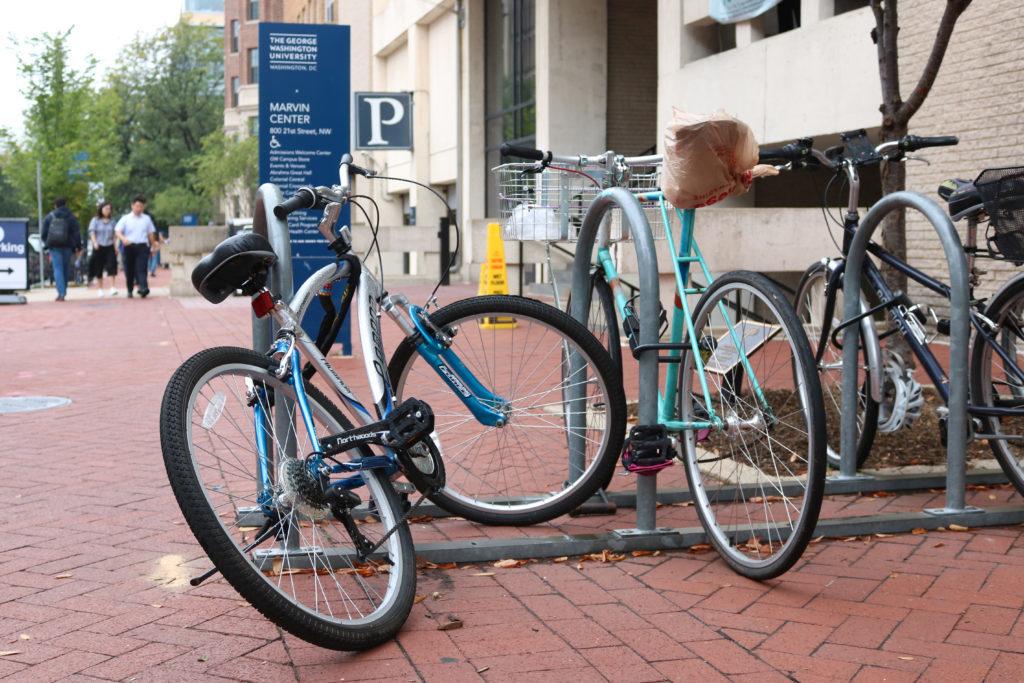Local bike share users could soon be free to leave a bike anywhere in the city – without worrying about parking at a docking station.
The D.C. Department of Transportation is testing a “dockless” bike system beginning next week allowing riders to locate, unlock and lock bikes electronically using a smartphone app, Kim Lucas, DDOT’s Capital Bikeshare coordinator, said. The new system would be more accessible and convenient for all cyclists, including students, who would no longer need to spend time searching for an available station near campus to pick up or drop off a bike, program representatives said.
Lucas said DDOT is accepting applications from “dockless” bicycle companies to obtain permits to operate in the city. The pilot program, which will run through next April, will allow the agency to evaluate the impact of freestanding bikeshare systems in the District. She said the goal is to make public bicycles more available for residents and tourists.
“With having bikes that don’t require stations there are lot more places where they can be parked and where they can be picked up,” Lucas said. “So truly if this works out well then there will be more bikes available.”
Capital Bikeshare is DDOT’s current bikeshare system, which includes more than 3,700 bicycles for public use that have to be docked at more than 400 stations scattered across the area, according the service’s website.
Capital Bikeshare operates in all eight wards in the District, but the new system will bring bicycles to communities that cannot accomodate stations, including spots on campus, Lucas said. But she added that the new bike program would expand on rather than replace Capital Bikeshare.
“I think for you guys specifically this could help improve access especially in places where we don’t yet have Capital Bikeshare,” she said.
The public can dock Capital Bikeshare bicycles near and on campus at 22nd and H streets, 22nd and I streets and 21st Street and Pennsylvania Avenue, according to Capital Bikeshare’s website.
The agency will evaluate the new system after the testing period to determine whether it should be implemented across the District, Lucas said.
Jack Song, a representative from LimeBike, a “dockless” bikeshare company, said LimeBike is working with DDOT to get permission to offer their bikes in D.C. If the company comes to the city, Song said it will offer a roughly 50-cent per-ride discount for students.
“You just find a bike on your phone and when you’re done with your ride and you arrive at your destination you can park anywhere that is a designated space or bike rack,” Song said. “I think that kind of convenience will be really useful for students.”
To use the “dockless” system, users can find available bikes on the app’s map and unlock a bike by scanning a code under the seat. The app then tracks the trip and once a user decides to park the bike, they manually lock it by pulling a lever on the back wheel until the next cyclist comes to use it, according to LimeBike’s website.
The company has crew members that attempt to ensure bikes are evenly distributed across the city, aren’t stuck in inaccessible places and aren’t blocking sidewalks or building entrances, he said.
LimeBike is currently offered in eight cities and on seven college campuses. The company takes on all maintenance and operation costs, meaning D.C. will not be paying to bring in the bikes, Song said.
DDOT has also asked residents to provide feedback through email by Friday about how the pilot program will run, including how many bicycles will be offered, what the parking regulations will be and what data will be accessible, according to a DDOT release.
David Alexander, a member of the D.C. Bicycle Advisory Council for Ward 2, which advocates for cyclists in the District, said although he welcomes easier access to bicycles, he fears that the new system would leave bikes scattered on sidewalks, blocking pedestrian traffic.
“We need sidewalks that are usable,” he said. “Sidewalks that are usable by busy foot traffic, elderly persons, handicapped persons, so unless that problem can be solved I oppose it.”




